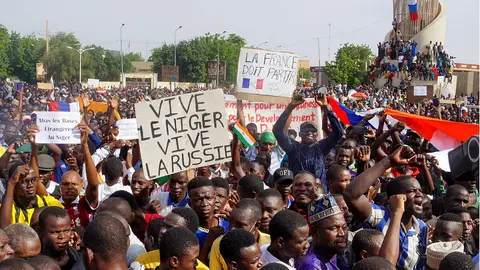Uranium key after Niger's coup d'état

As the crisis deepens in Niger following last week's coup d'état, there is growing concern in Europe over uranium exports from Niger, one of the world's leading uranium producers. According to the World Nuclear Association (WNA), Niger is the seventh largest producer of uranium in the world, a metal used mainly in nuclear energy, but also in cancer treatments and in the marine industry. Other countries with significant uranium reserves are Kazakhstan, which ranks first, accounting for 43% of the world's uranium, Canada and Namibia.
According to WNA, the Sahel country - now mired in instability following the military uprising - produced 2,020 metric tonnes of uranium in 2022 alone, accounting for 4-5% of global mine production. The previous year, 2021, production was even higher, reaching 2,991 tonnes of uranium. Although these figures are far behind the production figures of, for example, Kazakhstan - 21,227 tonnes in 2022 - they are of key importance for Europe, as the Old Continent is one of Niger's main customers in this market.
Within Europe, France stands out for its presence in several mines in the country, such as those located near the city of Arlit. The French company Orano, which specialises in uranium mining, is one of the main international companies operating in the country. In fact, despite the announcement by the new Nigerian authorities to suspend uranium exports to France, Orano has denied that supply has been frozen following the coup.

Despite Niger's position as France's third largest uranium supplier between 2005 and 2020 and the second largest in the European Union, the French and European authorities claim that the latest developments will not have an immediate impact on uranium needs.
As a French Foreign Ministry spokesman pointed out, uranium imports "are very diversified", recalling that Niger "represents only 4% of world production". A spokesman for Orano also expressed the same view, telling AFP that the current crisis in Niger "does not pose any short-term risks to the company's supply capacity, both in France and internationally". Like the Foreign Ministry representative, the Orano member stressed that uranium supply is "sufficiently diversified, with mines spread over four continents".
For its part, Brussels has also ruled out "supply risks" in the wake of the coup in Niger. "EU companies have sufficient stocks of natural uranium to mitigate any short-term supply risks," spokesman Adalbert Jahnz told a press conference. Regarding the longer term, Jahnz stressed that "there are sufficient stockpiles on the world market to cover the EU's needs".
Niger reopens borders with several neighbouring countries
In addition to uranium supplies, the stability of Niger and part of the Sahel is at stake in the aftermath of the coup. The African region has witnessed several military uprisings in recent years in other countries such as Mali and Burkina Faso, which also face drought, food insecurity and the advance of jihadist terrorism.
After the coup d'état against democratically elected President Mohamed Bazoum, who was close to the West, the military opted to close the borders with neighbouring countries. Now, a week after the uprising, the military junta led by Abdourahamane Tchiani has announced the reopening of land and air borders with Algeria, Burkina Faso, Mali, Libya and Chad.

As reported by Reuters, the reopened crossings are mainly in remote desert areas, while key entrances for trade remain closed due to sanctions imposed by the Economic Community of West African States (ECOWAS), which will soon meet in Nigeria to address the situation in Niger.
In addition, evacuations of foreign nationals residing in Niger have already begun. France, Italy and Spain announced the repatriation of their nationals after several protests in the country against the West, especially Paris. Recently, pro-coup supporters took to the streets of Niamey shouting anti-French slogans while waving Nigerian and Russian flags.










